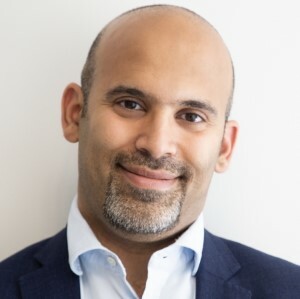
For those in the health and protection insurance industry, 2020 was a test of how quickly services could adapt to ensure they were still able to help people in the most unexpected of moments, and when few individuals could leave their homes.
Continuing to deliver what the industry does best, but virtually, has meant the private medical insurance (PMI) sector has proved to be a hotbed of innovation of late. And rather than slowing down, Dr Ali Hasan, chief medical & healthcare officer at Vitality, argues that industry innovation in healthcare offerings has, in fact, only just started.
We spoke to him about the acceleration of long-debated digital trends because of the pandemic, and why we are only at the beginning of a period of transformation when it comes to smart technology in the health insurance market.
Q: How is the post-Covid landscape revolutionising the healthcare and insurance space?
A: The upheaval caused by the pandemic has put health and wellbeing in the spotlight like never before. We are witnessing first-hand a healthcare revolution with a clear vision of the future that sees prevention and wellness deeply integrated into patients' healthcare journeys in an empowering, digitally-enabled setting. We've seen the adoption of health technology accelerate rapidly and a huge increase in the use of digital healthcare over the past 16 months especially.
Q: How has the acceleration in the adoption of digital health technology played its role?
A: Prior to Covid-19, remote healthcare utilisation was relatively limited, although remote GP consultations, which were introduced by Vitality as a fully integrated option to the PMI market in 2015, had become more common. But the earliest phase of the pandemic saw years of change take place within the space of weeks as providers and patients rapidly transitioned to digital approaches.
Most interactions in NHS primary care are now remote[1], and the number of Vitality GP video consultations our members access has doubled[2]. A materially larger proportion of specialist care also involves a remote consultation. Many more customers are demanding the rapid, convenient option of telemedicine, which removes transit and waiting times, although some will prefer the reassurance of a face-to-face consultation. All this means that customers will expect fast, seamless access to everything their health plan offers, all in one place.
Q: Have any other noticeable trends emerged over the past 16 months or so?
A: There has been greater willingness for customers to fund care via self-pay, but they will continue to expect a choice of care options and high-quality healthcare. There is also a further clear trend for them to expect the digital dividend from the pandemic to continue, and their needs and desires will be reflected in expectations around choice. They will want instant decisions on care requests or to track their progress; to arrange GP consultations directly and book consultations from a network of specialists using an online finder. They will expect self-referral and self-management pathways which empower them to access the right treatment as quickly and as easily as possible, from physiotherapy and mental health therapy to menopause support, cancer checks and Covid-19 testing - all aspects incorporated into our recent string of enhancements to our health insurance proposition.
'There has been greater willingness for customers to fund care via self-pay, but they will continue to expect a choice of care options and high-quality healthcare'
Dr Ali Hasan
Q: How else do you believe PMI will evolve in the coming years?
A: The evolution is ongoing, and innovation does not need to end with products and the sophisticated operating systems and smart technology underpinning them. Understanding data and the role clinical benefits of positive behavioural change play in ill-health prevention is destined to remain a priority. Having access to the right data and knowing how this can be used to influence the lifestyle decisions people make is the most fundamental part of supporting behaviour change in a meaningful way.
The best type of health insurance claim is one that is prevented. This is why Vitality utilises behavioural science as well as an ongoing wealth of data to empower people to take charge of their health and look after their wellbeing. By encouraging members to engage daily in a programme through a range of incentives, we aim to increase life expectancy and the number of years lived in good health in way that can help reduce the risks associated with aging and chronic conditions. The benefits of this are reflected widely; it's good for society and our health service thanks to the potential of less demand and is also good for the economy through a more engaged and productive workforce. That's why we believe, the future of health insurance is now.

Hear more from Dr Ali Hasan and a panel of top advisers about how the health insurance industry is evolving, on the Vitality Speaker Series webinar What's next for PMI? The future of healthcare in a post-Covid world available now on demand.
[1] https://www.health.org.uk/news-and-comment/charts-and-infographics/how-are-total-triage-and-remote-consultation-changing-the-us
[2] Vitality data - first four months of 2021 vs. the same period in 2020 GP consultations are up 75% and compared to 2019 they are up 104%











